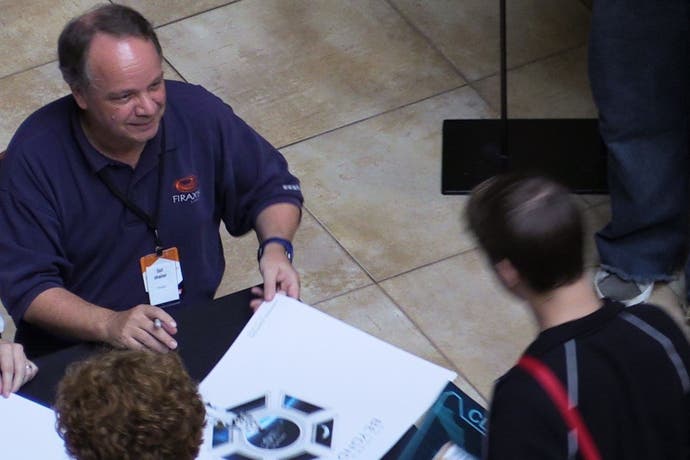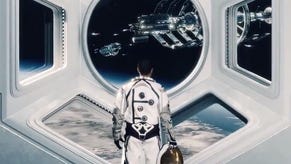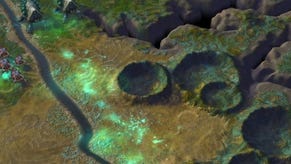Firaxis opens its doors at the first Firaxicon
The strategy studio hosts its fans.
There is what I would call an impassioned debate happening as I step onto the tour bus. I wouldn't say it goes as far as an argument, since those involved are far too excited and not nearly belligerent enough towards one another, but it's clearly an intense discourse. That age-old, nigh timeless topic has reared its head once again: is Civilization 5 really better than Civilization 4?
Of course, there can be no answer, no resolution for the Firaxis fans involved. Civilization 4 has problems with excess unit stacking, someone insists, but then Civilization 5 has the problem that you can't stack units. Civilization 4 is smarter. Civilization 5 simply looks better. It soon becomes obvious that, even if I did want to throw my hat in, there's nothing I can add. The conversation abruptly veers sideways into a variety of mods, some of them quite obscure, with all the qualities they bring. I'm way out of my league.
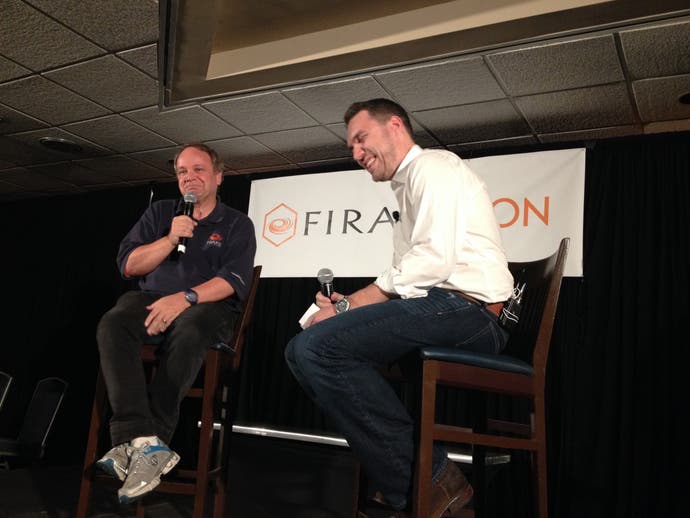
But this is Firaxicon, the first ever Firaxicon, and everyone present shares an enthusiasm for the studio's games of global domination or, occasionally, global defence. Just under 200 of Firaxis' most loyal fans have gathered at a hotel in Hunt Valley, Maryland, to meet with the the Civilization and XCOM developers - and while they've only paid 40 dollars for the privilege, it's not about the money. Some have journeyed thousands of miles across the country to do so. There's a chance to play an early build of Civilization: Beyond Earth and there's a chance to try out the forthcoming XCOM board game, but for most of the visitors the real excitement comes from the human element, from the opportunity to meet and mingle with designers like Ananda Gupta, Jake Solomon or even Sid Meier.
The debate about Civilization comes to an abrupt halt as the bus pulls into a parking lot outside a nondescript, single-story building. We're now a few miles down the road, in Sparks, and about to take a tour of the Firaxis headquarters. Inside, fans start to take pictures of almost everything: the rec room, the BAFTA awards, the games catalogue that stretches back to 1997, even the giant statue of one of XCOM's aliens. Of course they do. They're fans and they're doing what fans do, so it's no surprise that the conclusion of the tour takes the group past Sid Meier's office. Everyone peers in to get a glimpse of the prolific designer's desk, workspace and keyboard (Meier is an accomplished musician), almost as if it's a shrine. Later, back at the hotel, they'll form a line that snakes around the lobby as they collect autographs from Firaxis' most famous names, Meier included.
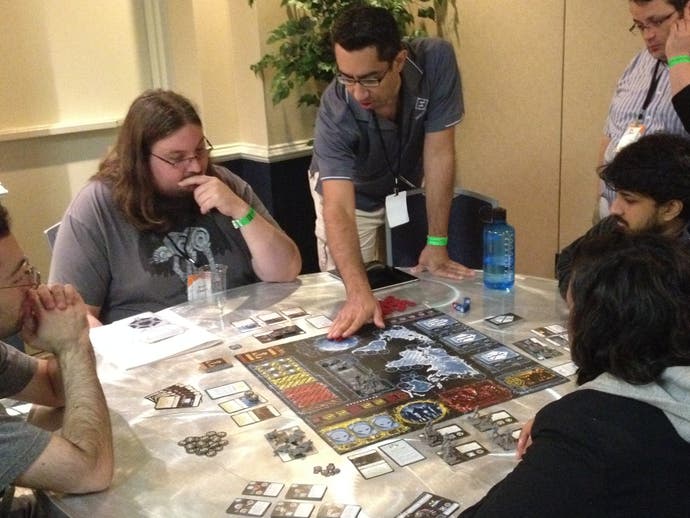
There's an exclusivity to the event. The modest attendance is the result of a strict cap and there's a sense that this is something of an experiment. Some of the organisers aren't exactly sure what to expect and wonder if the timetable, which runs for a full 24 hours from 10 in the morning, really will see attendees sticking around. It's a strange concern to have, since this is a studio renowned for making addictive and extremely lengthy video games. A game of any of the Civilization series can take between an afternoon and a weekend to complete. These are people who don't burn out easily; they're deep thinkers, intensely invested.
As the bus returns from Sparks to the hotel to collect the next of many more tour groups, one passenger starts talking about how the Civilization series ignited his passion for history, which eventually led him toward teaching. Another agrees, talking about cultures he learned of from the game and what he'd add to the next. Throughout the day, various panels run covering design decisions across various Firaxis games and after each there's always a crowd around the presenter. Everybody has questions and everybody wants to talk. The amount of intermingling and free access to Firaxis' top designers would make most games journalists green with envy; in a world of tight schedules and watch-tapping PRs, rarely is their public time so unrestricted.
Most of this happens in just two large lounges, panels in one and gaming in another, and the nature of both the games and the attendees means this isn't the most exuberant of gaming events. There's little of the whooping or brouhaha of Quakecon, but that doesn't mean there aren't cheers for the XCOM multiplayer tournament that runs through the day, nor enthusiastic rounds of applause for Meier as he takes the stage for the convention's after-dinner centerpiece.
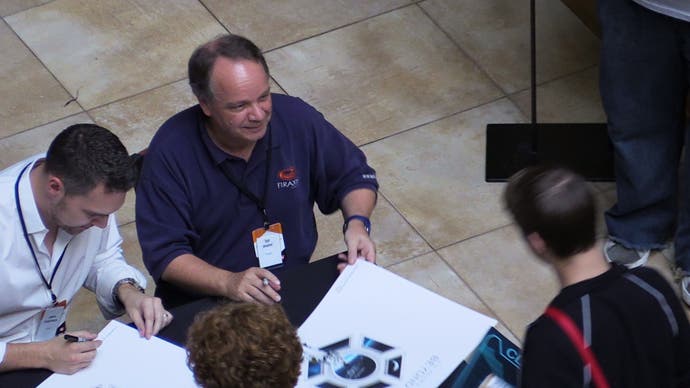
The slots for playing Civilization: Beyond Earth are ticketed to manage demand, fans making appointments to colonise alien worlds, while the beta edition of the forthcoming XCOM board game always has players in waiting. The latter, with its finely molded figures of soldiers and interceptors, is supplemented by a canny app that both acts as a referee and a reminder. It tells players what rounds of the game come next, helps them keep score and perform housekeeping tasks and, in its most merciless aspect, demands they make mission-critical decisions against the clock. The board fills with red UFO discs, the panic meters rise and players assigned roles such as chief scientist and squad leader struggle to manage their resources as a timer ticks down.
At several times during the day, board gamers outnumber those using PCs. Some are trying the Civilization board game or even games they've brought themselves, but there's nothing incongruous about this. Many of the Firaxis staff present are also joining in and hold board games in high esteem, having designed a few of their own or, at the very least, taken inspiration from their mechanics and design. Ed Beach, a gameplay and AI programmer, has half a dozen heavy wargames in his portfolio, some of which span continents in their scope and have estimated play times around the six hour mark. It's not difficult to see how he and Firaxis have found one another.
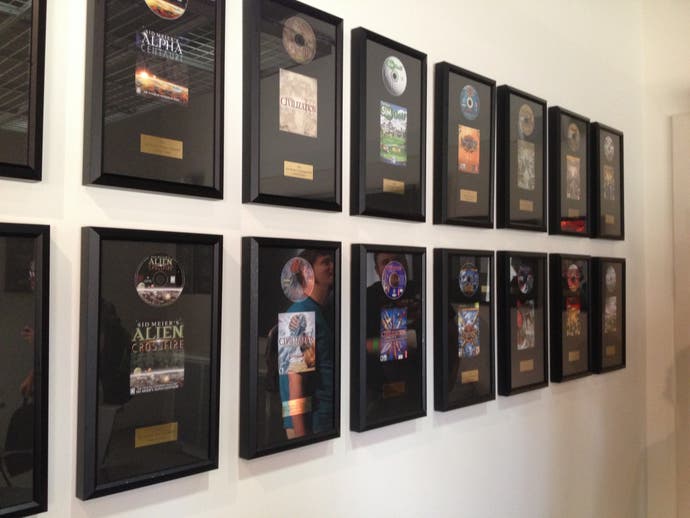
And board games are one of the first things that Meier mentions when he speaks, as he reflects on his history and influences. Turning up for the evening signing session and then staying for dinner, Meier seems to be the focus of everyone's attention whatever space he's in. The gaming area is transformed into single dining room in which all the attendees eat, before Meier takes to the stage for a question-and-answer session with Solomon.
At first it almost seems a chalk-and-cheese affair. Solomon is brash and playful while Meier is quiet and measured in his responses, but both crack wry smiles as the conversation develops and I'm not sure whether to believe Meier's story that his MicroProse business partner Lieutenant Colonel "Wild" Bill Stealy would really "turn up for work in a flight suit. You had to stand and salute." Solomon teases Meier's Swiss-Canadian origins, suggesting he's a spy, so Meier claims he made career changes after Cold War opportunities dried up.
Still, for all the achievements that Solomon tries to heap upon him ("Between 1987 and 1991 you made Pirates!, you made Railroad Tycoon and you made Civilization... That's less than the development cycle for XCOM!"), he's modest when he replies. There's a particular clarity to many of his statements, he justifies his career choices with sentences like "Having fun is important," and explains a lack of glorified violence in his games because "I had a son who was growing up... I felt a sort of a responsibility to make games that he could play."
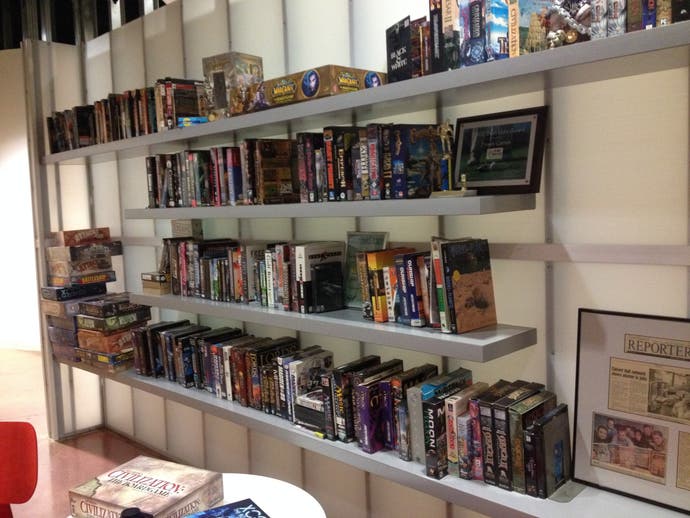
I find I'm sat next to Meier at dinner and he's quiet, unassuming and far more likely to listen than to speak. We talk a little about prototyping, the process of trying out game designs to see what works, as I hear Meier has an enormous collection of unreleased and half-finished ideas kept somewhere or other. The most well-known of these is a dinosaur game that Solomon questions him on, to see why it never worked out. "I was going to turn it into an RTS, Age of Empires with dinosaurs," Meier says. "But... there are no ranged dinosaurs. They'd just kind of cluster together and... chew on each other."
Solomon's questions are pre-prepared and there's no opportunity for any from the audience. After the chat, the applause and a few more moments in his chair, Meier leaves for the night. It doesn't seem he wants too much fuss and he may well have another idea, prototype or toy that he's keen to return to. "Today," he tells Solomon while on stage, "I'm 'Sid Meier.' But tomorrow, I'm going to go back to work." He says his latest indulgence is remote-controlled aeroplanes: "I know I'm not going to crash this next one."
After Meier's exit, a waitress comes in to tell me she didn't bring dessert because she was told not to interrupt the talk. I'm not surprised. For many, it was something of a sacred event, the convention's climax. What now remains is to play a few more games, and play them long into the night. The XCOM multiplayer tournament concludes with Fenix Torador winning a close victory and holding aloft a slightly comical Golden Muton trophy, while a passing wedding party stare bemused at the event they share a venue with.
The gaming continues long into the night, long after my own stamina has left me, and I'm not at all surprised to find people still playing at 10am the next day. The inaugural Firaxicon concludes with an atmosphere of community, even intimacy, and it surely can't be the only time that Firaxis will attempt this. Still, it might be the only time that it was ever so small or so informal, and I can imagine the next one being larger, louder and not nearly so loose. This was Firaxis' first turn and, like the cities in their Civilization games, from this they'll surely grow.
